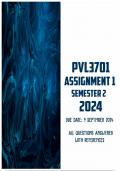Exam (elaborations)
PVL3701 Assignment 1 Semester 2 2024 | Due 9 September 2024
PVL3701 Assignment 1 Semester 2 2024 | Due 9 September 2024. Multiple Answers provided with references. Against this background consider the following set of facts: Lerato owns a townhouse in Pretoria. Lerato’s best friend, Karen, has been renting a room in Lerato’s townhouse since January 20...
[Show more]




